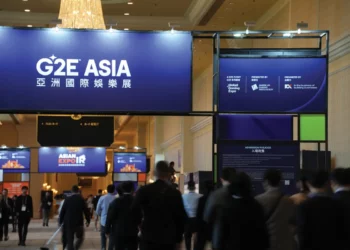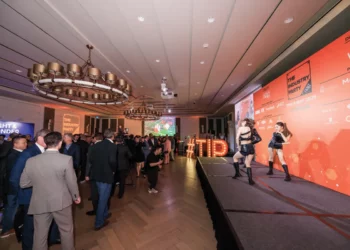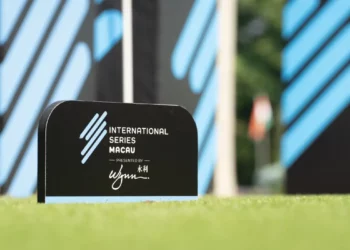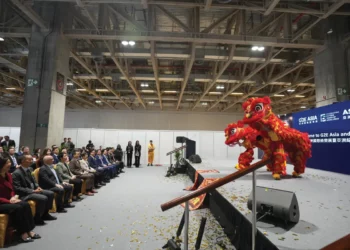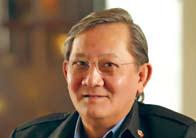 21 (21) Putera Sampoerna
21 (21) Putera Sampoerna
Founder, MANSION (Gibraltar) Ltd
Netherlands-born Indonesian tycoon Putera Sampoerna is the owner of MANSION, which runs an online casino, video poker, sports book and betting exchange from Gibraltar.
MANSION has become a truly global online gaming brand in the last few years, with a customer base stretching from Europe to East Asia. A sign of that global reach is the company’s shirt sponsorship for Tottenham Hotspur, an English Premier League soccer team. On the club’s second and third strip this season, the MANSION logo is accompanied by Chinese characters, making explicit the target audience for much of the sponsorship.
Mr Sampoerna has funded his betting venture from the family fortune which was built on some of Indonesia’s more traditional industries including palm oil and rubber production. Later, it expanded into tobacco, automobile and telecom interests. Mr Sampoerna sold the family’s clove kretek cigarette business to Altria (formerly Philip Morris) for more than US$5 billion in 2005—a move that gained him a position on Forbes magazine’s Indonesian Rich List.
Since his father’s death in 1994, Mr Sampoerna has been professionalising his empire by bringing in executives from Singapore, Taiwan, the US and Korea. He has also shown interest in luxury casinos with his purchase (and later sale) of London-based Les Ambassadeurs casino.
Mr Putera’s son, Michael, who runs a family investment vehicle, Sampoerna Strategic, is a professional poker player. His daughter Michelle manages the family’s philanthropy, including the Sampoerna Foundation, which was established to assist with a range of social projects including the improvement of public education in Indonesia, the training of teachers and support of ‘model’ schools.
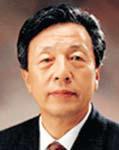 22 (22) Han Chang-Woo
22 (22) Han Chang-Woo
Chairman and CEO, Maruhan Corp
Japanese pachinko parlour operator Maruhan Corp. appears to be weathering the recession affecting Japan and the wider world. It recorded sales of 2.5 trillion yen (US$25 billion) for the fiscal year ending March 2009. It made a profit of 49.6 billion yen (US$540 million) during the same period.
Maruhan has 244 gaming parlours across the country and employs more than 12,500 people. The company was set up in 1953 and incorporated in 1957. More recently it has diversified into bowling alleys, golf driving ranges, amusement facilities, cinemas and other leisure-related business. Maruhan invested in the Macau casino resort Ponte 16, the joint venture between Success Universe Group (formerly Macau Success) and Dr Stanley Ho’s SJM. Ponte 16 opened in February 2008. Maruhan also opened a commercial bank in Cambodia last year.
Maruhan’s founder, Korean-born Han Chang-Woo, was placed at number 20 on ‘Japan’s Richest’ list 2009 with an estimated personal net worth of US$1 billion. That was up one place on his 2008 ranking, but his wealth was down US$600 compared to 12 months ago thanks to the credit crisis.
When father of six Mr Han, now aged 78, held a party to celebrate the 50th anniversary of Maruhan (which is still privately owned), he did so in style. He invited 2,000 guests and hired the Tokyo Philharmonic Orchestra to perform for them.
As Japan prospered during the 1950s, pachinko also thrived and Mr Han did well enough in the 1960s to move into the bowling industry. At one time he owned the nation’s largest alley. In the 1970s, Mr Han returned his focus to pachinko and rode the wave of the 1980s economic boom, which left him well positioned to take advantage of the long slide in Japanese asset prices in the 1990s and allowed him to continue building his company and increasing his share of pachinko parlours. Even as Japan struggled to regain its feet after the decade-long economic slowdown, Maruhan Corp prospered.
Mr Han expanded his parlours into central locations as space became available; he built multi-floor emporiums that lure customers with innovations including non-smoking sections, free parking and improved odds of winning. The cash flow from these large, successful outlets helped diversify Maruhan into the conglomerate it is today.
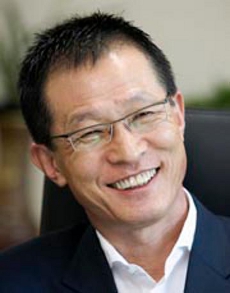 23 (-) Choi Young
23 (-) Choi Young
President, Kangwon Land
Kangwon Land’s main hotel casino, which opened in April 2003, is the only one of South Korea’s 17 casinos open to Korean nationals.
Despite being a gruelling four-hour drive to the east of the national capital Seoul and containing just 132 gaming tables and 960 slot machines, it is one of the highest grossing casinos in the world in real terms, bringing in the equivalent of around US$1 billion in revenue annually.
Locals inform Inside Asian Gaming that Kangwon Land is so popular among South Koreans that hard-up pensioners with time on their hands arrive early at the casino to occupy seats at the crowded tables, and then charge eager gamblers arriving later up to US$700 for those seats on the weekend. One of the management’s innovations has been to make the whole complex a non-smoking area, which must also make it more pleasant for the chair-minding old folk.
For the young or the young at heart, the operating company has diversified and now also owns High 1 Ski Resort, a premium slope on 925,000 square metres of land next door to the hotel and casino. It has also made a successful transition from state-run monopoly to successful private company.
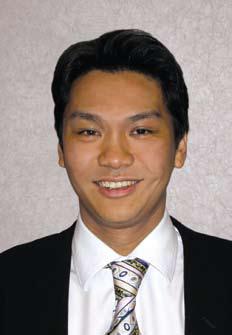 24 (28) Justin Leong Ming Loong
24 (28) Justin Leong Ming Loong
Head of Strategic Investments and Corporate Affairs, Genting Group
Many large publicly traded companies in Asia are still family-run, and Genting Group is no exception. Justin Leong is a grandson of the group’s founder Lim Goh Tong. His boss is his uncle Lim Kok Thay, the brother of Mr Leong’s mother Siew Lian.
It would be misleading, however, to assume nepotism is the guiding principle within Genting. No major company could survive in a competitive industry such as gaming and during the current challenging trading conditions without having talent at the top.
Oxford University-educated Mr Leong plays a key role as a ‘big picture’ man, looking out for new investment opportunities and also talking to existing investors and to the media.
Genting has probably been the most proactive of all the major Asian gaming companies in understanding the value of good public relations in an age of globalised business and 24-hour news.
Even those companies with a good in-house PR department tend to appoint outsiders to this role. The fact that Mr Leong is one of the family and has direct access to the top man in the organisation indicates the business value that Genting attaches to positive publicity and a good corporate image. Genting’s core markets for its gaming operations are Malaysia and soon Singapore, two jurisdictions where support for its gaming business cannot be taken for granted because of domestic political considerations. It’s not surprising, therefore, that the company places great store in protecting its image and its reputation as a company of probity.
On the strategic front, Mr Leong reportedly played a key role in the Group’s decision to take a stake in the cash-pressured MGM MIRAGE recently, as well as the decision to make the group in effect the United Kingdom’s biggest casino operator by purchasing a controlling stake in Stanley Leisure in 2006.
Mr Leong is also in a position to speak to the banking community in their own language and on their own terms, having started his career at Goldman Sachs in London where he was an analyst in the M&A division and an associate in global technology equity sales.
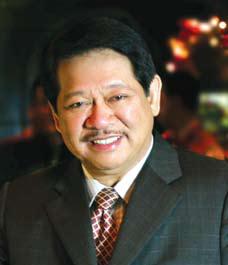 25 (11) Efraim Genuino
25 (11) Efraim Genuino
Chairman and CEO, PAGCOR
Dr Genuino’s influence on Philippines gaming and on the wider political and social scene has been significant. He slips into the second half of the Asian Gaming 50 – 2009 list this year only because his term of office is due to expire soon to coincide with presidential elections scheduled for 2010.
It was Dr Genuino who led the planning of the ambitious Manila Bay project for the creation of one of Asia’s biggest leisure zones featuring gaming, entertainment, shopping and residential developments. He has also presided over the expansion of PAGCOR’s online gaming licensing regime domiciled in the Cagayan Economic Zone Authority (CEZA), as well as the licensing of a number of other gaming projects around this nation of islands. PAGCOR reported total revenues of P14.6 billion (US$302 million) for the first half of 2009.
As the leader of PAGCOR, Dr Genuino has been lobbyist for the Philippines gaming industry, gatekeeper of its standards and diplomatic link between investors in the sector and sometimes hostile politicians and churchmen. As the head man at PAGCOR, Dr Genuino is responsible for disbursing large amounts of tax money both as remittances to the central government and as grants for support of sports and social programmes. By the conventions of the Philippines political system, Dr Genuino and his senior management team at PAGCOR will be expected to step down at or before the next Presidential elections in 2010. The reason is that the presidential incumbent, Gloria Macapagal-Arroyo, will not be seeking re-election, and the incoming president has the prerogative to appoint his or her own senior executive team at PAGCOR.
Dr Genuino has been tipped as a possible future presidential hopeful in his own right, although some commentators think that honour is more likely to fall to his son.
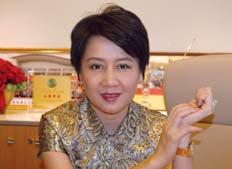 26 (34) Angela Leong On-kei
26 (34) Angela Leong On-kei
Director, Sociedade de Jogos de Macau
Ms Leong is best known as the fourth official consort of Macau’s former gaming monopolist Stanley Ho, and is mother of his five youngest children. Whether she would have become a director of STDM—parent company of SJM, which operates Dr Ho’s casino interests in Macau—without her strong domestic CV is a moot point.
Ms Leong’s profile in Asian gaming is likely to be consolidated over the years as the children she has borne Dr Stanley Ho mature and stake their own claim to a position in the family business. Ms Leong is reputed to be a savvy businesswoman and fierce dealmaker and is often at the forefront of campaigning for the gaming industry in general, and the interests of her company in particular.
Ms Leong is also a Macau legislator and leader of the Macau Development Alliance party. She was elected to the Legislative Assembly in 2005 as one of those candidates selected by direct ballot rather than the complex hybrid scheme of nomination also used to select lawmakers in the territory. Also on the party ticket was Dr Ho’s long-time lieutenant Dr Ambrose So, though he failed to retain his seat.
Ms Leong is seeking re-election to the Legislative Assembly on 20th September and is likely to maintain a significant profile in Macau public life.
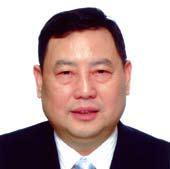 27 (33) Theodore “Teddy” Cheng Chee Tock
27 (33) Theodore “Teddy” Cheng Chee Tock
Chairman, C Y Foundation
C Y Foundation has been at the forefront of serving the demand for non-casino online games in the Mainland China market.
Internet use is exploding in China. There were 338 million users as of June this year (up 13.4% in six months), according to the government-funded China Internet Network Information Center (CNNIC). It’s safe to assume that figure is already out of date. By June, the number of mobile Internet users had reached 155 million, accounting at that time for 46% of all Internet users and representing a 32.1% increase within six months. More than two-thirds of China’s Internet users are under 30, according to CNNIC.
Teddy Cheng and his management team spotted early on that role playing and casual games played on a subscription basis offered not only huge potential in the China market, but were also less likely to attract the sort of hostile regulatory action typically associated with online casino games, where search engines and Internet censors often block sites and providers.
The number of Chinese Internet users shopping online rose to 87.88 million in the six months to June 2009, an increase of nearly 14 million from December 2008, while the use of online payment increased by 4.8%. The CNNIC survey suggested only 30% of Internet users believe online transactions are safe from fraud.
C Y Foundation’s business model is to a large extent protected from the online fraud issue because much of its business is conducted face-to-face with customers via Internet cafés, rather than via card payment online. C Y Foundation says it is the only company dedicated to organising and running player-to-player (P2P) tournaments for prizes in Internet cafés throughout the Mainland.
In August, C Y Foundation announced that it was taking an effective 20% stake in Paradise Entertainment, a casino gaming supplier and operator of live dealer electronic table gaming terminals and progressive jackpots in the Asia Pacific region. The share deal involves C Y Foundation injecting HK$40 million (US$5.1 million) in working capital into Paradise Entertainment.
Mr Cheng is a renowned entrepreneur in Mainland China. He has acted as chief representative or principal consultant in Mainland China to foreign firms including AT&T, Unisys, Honeywell, Hewlett Packard and IBM. Both Mr Cheng and his wife are scions of prominent families that have active links to the very top of China’s political hierarchy. Mr Cheng has also acted in an advisory capacity to several provincial and municipal governments in China.
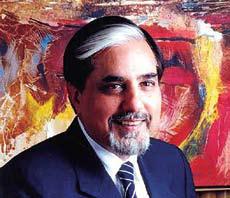 28 (29) Subhash Chandra
28 (29) Subhash Chandra
Non-Executive Chairman, Essel Group
Subhash Chandra, a former rice trader turned mass media entrepreneur, returns to the Asian Gaming 50 – 2009 as the founder of Playwin, India’s first online lottery business.
Although only a fraction of India’s 1.1 billion-plus people have access to the Internet, low-income adults can play electronic lottery games by visiting terminals located in shops.
The lottery is promoted in cyberspace as myplaywin.com. It has a reputation among players as fair in a country where paper lotteries are widely regarded with suspicion as corrupt.
Playwin and traditional paper lotteries are licensed on a state by state rather than a national basis. Playwin was floated on the Indian stock market in November 2001, initially winning online lottery franchises for the governments of Sikkim, Karnataka and Maharashtra.
Market research about online gaming in India is limited. But a report by the Internet & Mobile Association of India in 2008 estimated that the sector, including casual and role-playing games as well as lotteries, would be worth US$200 million by 2010.
Playwin products certainly appear to have captured the public imagination. In a country where according to the World Bank half the population earn less than one US dollar per day, Playwin’s record lottery prize (the product of a rollover from previous draws without any top prize winner) amounted to a staggering US$3.5 million won by a resident of Kolkata in May 2006.
Playwin’s potential for profitability is hugely boosted by the fact that its products and services can be supported and cross-marketed by other parts of the Essel Group empire without (so far) any troublesome regulation imposed by national politicians.
An example is that Playwin lottery products have now expanded into the offline entertainment market using pre-paid scratch cards produced by ItzCash, another Essel business. The services offered by myplaywin.com cards can also be accessed by mobile phones through SMS. The lottery results are in turn promoted on Play TV, an Essel Group operation and India’s first interactive gaming television channel.
Mr Chandra’s Essel Group also owns Hindi TV broadcaster Zee Entertainment, with an estimated 500 million viewers in 167 countries. His son Punit was named Zee’s chief executive in August last year. The Essel business is still family run, with Mr Chandra’s brothers heading Zee News and Dish TV respectively. Other businesses include amusement parks.
Subhash Chandra came 28th in FORBES’ ‘India’s 40 Richest’ list in December last year. As a result of the global credit crisis, however, he was relegated from FORBES’ global list of billionaires as his net worth was estimated at US$970 million. In 2007, Mr Chandra was ranked at 407 on the ‘World’s Billionaires’ list’ with a net worth of US$2.3 billion.
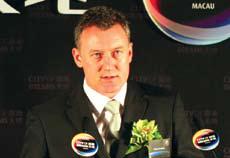 29 (-) Greg Hawkins
29 (-) Greg Hawkins
Chief Executive Officer, City of Dreams
Greg Hawkins earns a place in Asian gaming history as one of the executives who presided over Macau’s record-breaking 1.35% commission offer made to VIP betting agents to revive the fortunes of Crown Macau (now Altira).
It certainly worked for a while. After the commission deal was struck with junket consolidator Amax in December 2007, Crown Macau went from single digits in terms of market share of Macau VIP gross to grab around one fifth of the entire high roller segment in a matter of months. The hangover from the party came later when the other operators responded with a price war, a global recession started and the effects of baccarat’s inherent volatility kicked in.
In May 2008, Mr Hawkins moved from Crown Macau after just over two years as Chief Executive to take up the equivalent post at City of Dreams (CoD), Melco Crown Entertainment Ltd’s (Nasdaq: MPEL) first integrated resort in Macau.
His challenge now is to turn CoD into the kind of VIP hotspot that Crown Macau used to be. That task got a little more challenging recently when the Macau operators’ newly formed trade body agreed to cap commissions to agents at 1.25% of rolling chip turnover.
Mr Hawkins remains upbeat, however, that the quality and range of CoD’s VIP offer will earn the loyalty of newly arrived customers on both the agent and player sides, and bring in new business.
The early indications are that it’s working. MPEL doubled its market share of Macau gross gaming revenue in July, the month after CoD opened, recording an 18% share, compared to 9% in June.
Prior to joining MPEL, Mr Hawkins was general manager for gaming at SKYCITY Entertainment Group, a gaming and entertainment enterprise listed in Australia and New Zealand. At Skycity, he managed the gaming operations and strategies across multiple casino businesses in New Zealand. He also served as a director of Skycity Australia during the period between 2001 and 2004, overseeing the operations of Skycity’s casino in Adelaide, Australia, as well as the gaming machine and food and beverage businesses of Skycity in Auckland, New Zealand from 1998 to 2001. Before joining Skycity, he was with Crown Melbourne Limited beginning in 1994 as an initial member of the executive team that launched the Crown Casino Melbourne.
Mr Hawkins also has experience in both the mass market and high roller segments, serving as a senior manager with the Victoria TAB gaming division in Australia between 1990 and 1994.
 30 (-) Jamie Odell
30 (-) Jamie Odell
Chief Executive Officer and Managing Director, Aristocrat Leisure Ltd
Jamie Odell was hired by Aristocrat Leisure Ltd to maintain and build the company’s strong technical team while at the same time reinvigorating its focus on the ultimate VIPs—its consumers.
The CEO, who recently completed a strategic review of company operations, has the necessary background to understand consumer demands and respond to them.
He came to Aristocrat from Foster’s Group, the Australian drinks conglomerate, where he was managing director of its Australia, Asia & Pacific division. Mr Odell also has experience in consumer retailing in a wide range of international markets.
In August, Mr Odell announced what the company called a ‘transformation programme’, to focus particularly on building the company’s business in Japan, Australia and North America.
He said the aim was to reduce earnings volatility across the company’s operations and deliver sustainable growth. That included doubling Aristocrat’s share of the North American market for revenue share agreements between slot manufacturers and casinos over the next five years. To achieve that aim, Aristocrat planned to base more of its management team in North America, said Mr Odell.
In an interview with Inside Asian Gaming published in July, Mr Odell also hinted at Aristocrat moving into the stepper market in Asia and other markets, where companies such as WMS and Bally Technologies currently have a strong presence. He also suggested Aristocrat may move to expand its video slot offer by releasing new products with strong all-round entertainment themes.























